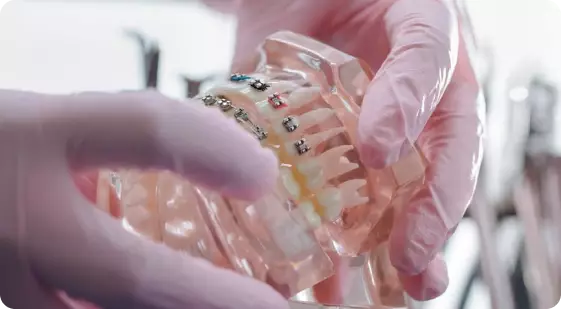Braces
Metal And Ceramic Braces For A Straighter And Healthier Smile
Orthodontics is a branch of dentistry that helps diagnose, prevent and treat problems in the alignment of teeth and jaws. The medical term for such issues is malocclusion, which means bad bite. Crooked, crowded, gapped or overlapping teeth are just some examples of teeth misalignments. If not corrected, they can worsen, leading to cavities, gum disease and chewing and speaking difficulties. Smile aesthetics are also affected.
At Lower Plenty Dental, our orthodontic treatments include ceramic and metal braces and Invisalign clear aligners. These dental appliances exert gentle and continuous pressure to move the teeth towards better alignment, improving long-term oral health and helping you get a well-balanced smile.
How Do Braces Work?
Braces use steady pressure to move teeth into their proper positions gradually. They consist of the following components:
- Brackets are “handles” bonded to the teeth’ outside surface. Metal brackets are the most common type, but tooth coloured brackets are also available.
- Archwires deliver the force to move teeth.
- Ligatures are tiny rubber rings or fine twisted wires that tie the archwire to each bracket. The rubber rings are usually grey, but coloured ligatures are very popular.
- Bands are flat metal rings cemented around a tooth to attach a bracket or any other type of fitting. These are usually placed on the very back teeth.


Metal & Ceramic Braces In Lower Plenty
Treatment time for braces can vary depending on the complexity of your case and the condition of your teeth. However, orthodontic treatment with braces can take 18 to 24 months on average. Maintaining good oral hygiene, patient compliance and regular appointments are essential in keeping treatment time on schedule.
We begin with an initial consultation which includes a thorough examination of your teeth. This allows us to determine the most suitable treatment option, and advice on when it should commence, the duration and the approximate cost. If you decide to proceed, we will take photographs, X-rays and plaster models of the teeth, jaws and face. This allows us to provide an accurate analysis of your case for successful treatment outcomes. They are also used as a record of the existing malocclusion for future reference.
Our treatment options consist of metal and ceramic braces. Metal braces can be jazzed up by placing coloured ligature ties on the brackets. If you prefer a more discreet look, we can use ceramic brackets with a metal wire. Alternatively, if you want a virtually undetectable option, Invisalign clear aligners may be a fantastic choice.
Tailored Orthodontic Solutions For Stronger, Straighter Teeth

